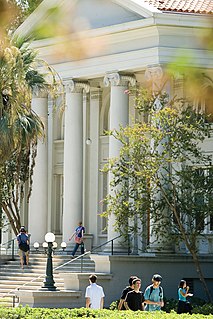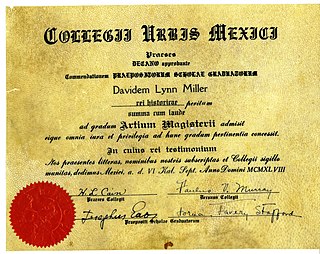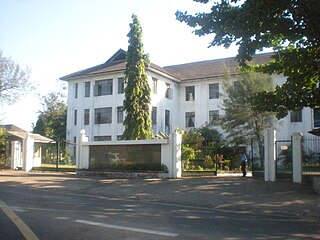Related Research Articles

A community college is a type of educational institution. The term can have different meanings in different countries: many community colleges have an "open enrollment" for students who have graduated from high school. The term usually refers to a higher educational institution that provides workforce education and college transfer academic programs. Some institutions maintain athletic teams and dormitories similar to their university counterparts.
An academic degree is a qualification awarded to students upon successful completion of a course of study in higher education, usually at a college or university. These institutions commonly offer degrees at various levels, usually including bachelor's, master's and doctorates, often alongside other academic certificates and professional degrees. The most common undergraduate degree is the bachelor's degree, although in some countries there are lower level higher education qualifications that are also titled degrees and higher level.

Undergraduate education is education conducted after secondary education and prior to postgraduate education. It typically includes all postsecondary programs up to the level of a bachelor's degree. For example, in the United States, an entry-level university student is known as an undergraduate, while students of higher degrees are known as graduate students. In some other educational systems, undergraduate education is postsecondary education up to the level of a master's degree; this is the case for some science courses in Britain and some medicine courses in Europe.

The Chartered Management Institute (CMI) is a professional institution for management based in the United Kingdom.

A diploma is a certificate or deed issued by an educational institution, such as college or university, that testifies that the recipient has successfully completed a particular course of study. The word diploma also refers to an academic award which is given after the completion of study in different courses such as diploma in higher education, diploma in graduation or diploma in post-graduation. Historically, it can also refer to a charter or official document, thus diplomatic, diplomat and diplomacy via the Codex Juris Gentium Diplomaticus.
The International Baccalaureate (IB), formerly known as the International Baccalaureate Organization (IBO), is a nonprofit foundation headquartered in Geneva, Switzerland, and founded in 1968. It offers four educational programmes: the IB Diploma Programme and the IB Career-related Programme for students aged 15 to 19, the IB Middle Years Programme for students aged 11 to 16, and the IB Primary Years Programme for children aged 3 to 12. To teach these programmes, schools must be authorized by the International Baccalaureate.
A diploma mill is a company or organization that claims to be a higher education institution but provides illegitimate academic degrees and diplomas for a fee. The degrees can be fabricated (made-up), falsified (fake), or misrepresented. These degrees may claim to give credit for relevant life experience, but should not be confused with legitimate prior learning assessment programs. They may also claim to evaluate work history or require submission of a thesis or dissertation for evaluation to give an appearance of authenticity. Diploma mills are frequently supported by accreditation mills, set up for the purpose of providing an appearance of authenticity. The term may also be used pejoratively to describe an accredited institution with low academic admission standards and a low job placement rate. An individual may or may not be aware that the degree they have obtained is not wholly legitimate. In either case, legal issues can arise if the qualification is used in résumés.
A graduate diploma is generally a qualification taken after completion of a first degree, although the level of study varies in different countries from being at the same level as the final year of a bachelor's degree to being at a level between a master's degree and a doctorate. In some countries the graduate diploma and postgraduate diploma are synonymous, while in others the postgraduate diploma is a higher qualification.

A postgraduate diploma is a postgraduate qualification awarded after a university degree, which supplements the original degree and awards them with a graduate diploma. Countries that award postgraduate diplomas include but are not limited to Bangladesh, Barbados, Belgium, Brazil, Canada, Chile, Colombia, Germany, Hong Kong, Jamaica, Spain, Kenya, South Africa, India, Ireland, the Netherlands, New Zealand, Nigeria, Republic of Panama the Philippines, Portugal, Russia, Pakistan, Poland, Saudi Arabia, Singapore, Sweden, the United Kingdom, Sri Lanka, Trinidad and Tobago and Zimbabwe. Level of education and recognition differ per issuing country.
The specialist degree is an academic degree conferred by a college or university. The degree is formatted differently worldwide and may be either a five-year program or a doctoral level graduate program that occurs after a master's degree but before a doctoral degree.
The International Baccalaureate Diploma Programme (IBDP) is a two-year educational programme primarily aimed at 16-to-19-year-olds in 140 countries around the world. The programme provides an internationally accepted qualification for entry into higher education and is recognized by many universities worldwide. It was developed in the early-to-mid-1960s in Geneva, Switzerland, by a group of international educators. After a six-year pilot programme that ended in 1975, a bilingual diploma was established.

The Royal Welsh College of Music & Drama is a conservatoire located in Cardiff, Wales. It includes three theatres: the Richard Burton Theatre, the Bute Theatre, and the Caird Studio. It also includes one concert hall, the Dora Stoutzker Hall. Its alumni include Anthony Hopkins, Aneurin Barnard and Rob Brydon.

The Yangon University of Economics is the finest university of economics and business in Myanmar. Founded as the Section of Economics of Yangon University in 1924, the section became an independent university of higher learning in 1964. The University offers undergraduate and graduate degrees and diplomas, mostly in commerce, statistics and economics. It is also the best business school in the country, offering full-time, executive MBF, MHTM, MMM and MBA degrees.
The South Pacific Underwater Medicine Society (SPUMS) is a primary source of information for diving and hyperbaric medicine physiology worldwide.
Sándor Katona is a Hungarian glider aerobatic pilot.

Uganda Management Institute (UMI) is a government-owned national center for training, research, and consultancy in the field of management and administration in Uganda. It is one of the nine public universities and degree-awarding institutions in the country outside the military.
Aseana College is a college in Kota Kinabalu, Sabah, Malaysia. Founded in 2008, the college provide courses on medical sciences. It is located on two campuses, with the main and administrative centre located in Sembulan, while the second campus is located kilometres away from the main campus.

Cavendish University Uganda (CUU) is licensed and accredited by the Uganda National Council for Higher Education (UNCHE), and was established in 2008.It is ranked 20th best university in Uganda and 10593th in the world.
A high school diploma is a North American academic school leaving qualification awarded upon high school graduation. The high school diploma is typically obtained after a course of study lasting four years, from grade 9 to grade 12. The diploma is awarded by the school in accordance with the requirements of the local state or provincial government. Requirements for earning the diploma vary by jurisdiction, and there may be different requirements for different streams or levels of high school graduation. Typically they include a combination of selected coursework meeting specified criteria for a particular stream and acceptable passing grades earned on the state exit examination.
References
- ↑ "Diploma Business". TIME . February 27, 1939. Archived from the original on December 14, 2008. Retrieved 2008-11-03.